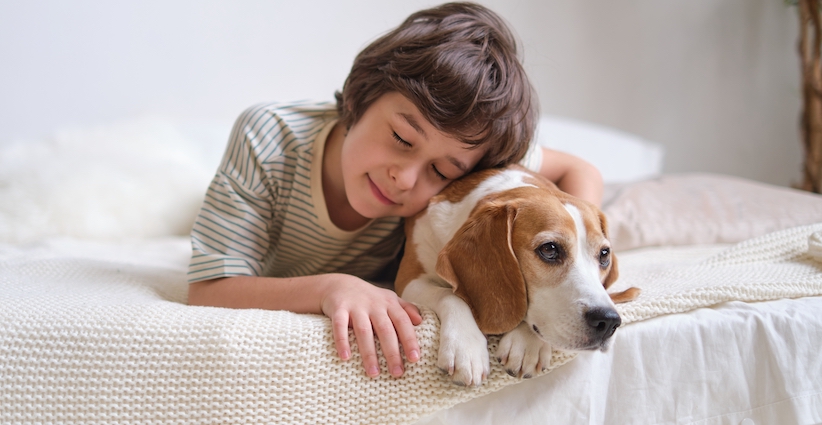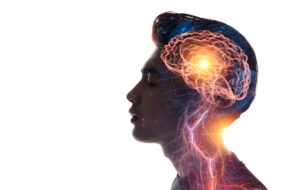Service Dogs Help Autistic Kids Sleep Better

A recent research study found that living with a service dog helped autistic children fall asleep faster, stay asleep longer, and feel less anxious at bedtime. The results were published last month in Frontiers in Psychiatry.
Autism spectrum disorder is a developmental disorder affecting roughly 1 in 36 children. In addition to issues with communication, social interactions, repetitive behaviors, or hyperactivity, many autistic children and teens experience sleep-related problems.
A team of researchers from the University of Arizona, University of Virginia, and Purdue University enrolled 75 families with autistic children registered with a U.S. non-profit service dog provider. The children’s caregivers completed surveys about how they, their autistic child, and the family manage on a daily basis. Questions covered topics ranging from stress, relationships, and behaviors to sleep and pet bonding.
The researchers compared the survey responses of 39 families that had received service dogs from the non-profit with those of 36 families still on the service dog waiting list. While the researchers had set out to explore how service dogs might impact autistic children and their families on multiple measures, sleep turned out to be the most positively affected factor. The findings showed that autistic children with service dogs slept significantly better than those on the waiting list.
In addition to experiencing improved sleep with a service dog around, autistic children in the study were more likely to sleep in their own bedrooms instead of wanting to sleep with a parent or caregiver. The study authors theorize that the children in the study slept better with a service dog, because the dogs “provide a sense of security and comfort” at night.

As of 2022, there were 64 non-profit organizations providing service dogs to autistic people. But, current research on the social, mental health, and physical benefits of service dogs for autistic people is limited. Some of the past research has returned mixed results, with some studies suggesting that service dogs do not significantly help autistic children or their families.
Other studies have found that service dogs could reduce autistic children’s symptoms and their parents’ stress levels and improve the functioning of the entire family. This new study’s results help bolster proponents’ argument that service dogs do provide benefits to autistic children and their families, particularly in the realm of sleep.
The authors say their study will help inform future research. It shows that the dogs’ therapeutic effect on autistic children’s sleep is a key area to explore. Larger studies following these families over time and using objective sleep data, such as from sleep trackers, would help determine whether service dogs can be a valuable resource.
Got a hot tip? Pitch us your story idea, share your expertise with SleepFoundation.org, or let us know about your sleep experiences right here.
References
6 Sources
-
Rodriguez, K. E., Rispoli, M., Kelleher, B. L., MacLean, E. L., & O’Haire, M. E. (2024). The effects of service dogs for children with autism spectrum disorder and their caregivers: A cross-sectional study. Frontiers in Psychiatry, 15, 1355970.
https://pubmed.ncbi.nlm.nih.gov/38463432/ -
Centers for Disease Control and Prevention. (2023, April 4) Data & Statistics on Autism Spectrum Disorder., Retrieved March 20, 2024, from
https://www.cdc.gov/ncbddd/autism/data.html -
Augustyn, M. (2024, January 24). Autism spectrum disorder (ASD) in children and adolescents: Terminology, epidemiology, and pathogenesis. In R. G. Voigt & N. Tehrani (Eds). UpToDate., Retrieved March 18, 2024, from
https://www.uptodate.com/contents/autism-spectrum-disorder-asd-in-children-and-adolescents-terminology-epidemiology-and-pathogenesis -
Augustyn, M., & von Hahn, L. E. (2023, May 17). Autism spectrum disorder in children and adolescents: Clinical features. In R. G. Voigt & N. Tehrani (Eds). UpToDate., Retrieved March 18, 2024, from
https://www.uptodate.com/contents/autism-spectrum-disorder-in-children-and-adolescents-clinical-features -
Dollion, N., Poirier, M., Auffret, F., François, N., Plusquellec, P., Grandgeorge, M., Handi’Chiens, & Fondation Mira (2024). Effects of service dogs on children with ASD’s symptoms and parents’ well-being: On the importance of considering those effects with a more systemic perspective. PloS One, 19(1), e0295702.
https://pubmed.ncbi.nlm.nih.gov/38170689/ -
Leighton, S. C., Rodriguez, K. E., Nieforth, L. O., & O’Haire, M. E. (2023). Service dogs for autistic children and family system functioning: A constant comparative analysis. Frontiers in Psychiatry, 14, 1210095.
https://pubmed.ncbi.nlm.nih.gov/37520226/













































































































































